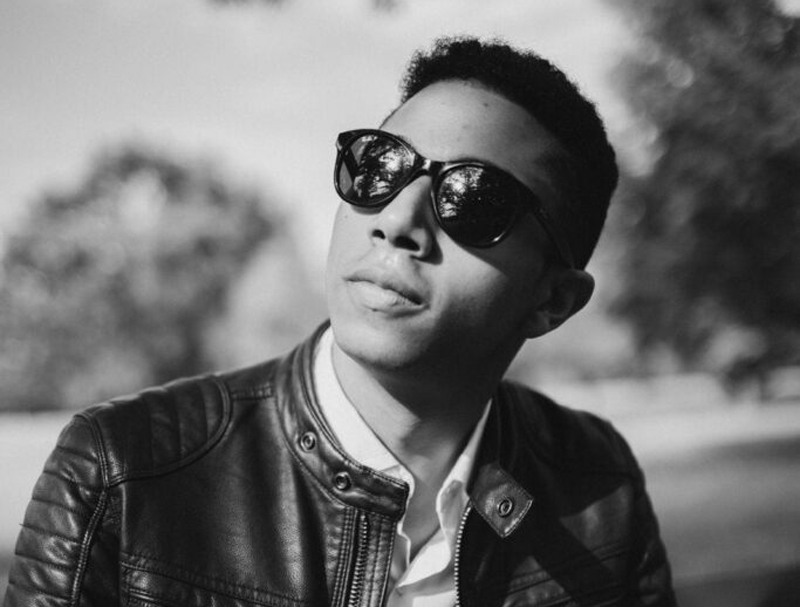The Morocco effect worldwide ! Tarik Jaawani takes us stateside to show us how the Kingdom has shaped his style as an artist, photographer, and cinematographer. «I have always found myself between two worlds…now I want to tell my story».
We sat down with Tarik Jaawani – artist, photographer, and cinematographer – for VH Magazine’s latest segment on Morocco’s influence around the world. At only 21 years of age, Tarik is an up-and-coming talent, and one to watch for in the future. In his mini-documentary “The Kingdom of Morocco”, Tarik gives a touching tribute to his second home. In his short film “Hindsight”, Tarik provides us with an intimate look into his life growing up in rural Pennsylvania.
His works are rooted in his ability to connect with viewers on a human level. The first thing that you notice about Tarik is that he is a natural storyteller. There is something very eloquent and comforting about his voice, which creates a sense of ease when watching his films. It is as if you were talking to an old friend. Tarik uses his talents to personally bring us along the journey of his life, as he sees it, in his own words.
Tarik is a Moroccan-American from Long Island, New York, who grew up in rural Pennsylvania. His father is originally from Casablanca, who traveled to the United States in the late 80s, whilst playing for the Moroccan national basketball team.
“He loved the country so much that he eventually flew back and set up shop here. That’s when he met my mother, a 20 year veteran of the NYPD, who at the time was studying at law school. It was my father who bought me my first camera, a Sony Handycam. I remember I would spend hours creating stop-motion films, staging elaborate action scenes with Lego.”
Tarik speaks fondly of Morocco, having visited the country every year since he was born. The country has served as the backdrop to many of the most incredible experiences of his life. If you were to drop Tarik anywhere along the Atlantic coast of the Kingdom, he could find his way back home.
“Every year that I have been on this earth, every day I have had a beating heart, Morocco has played a role in every facet of my being. Morocco is my home and I miss the country dearly, given that I was unable to travel back this year due to the pandemic that has gripped the world.”

After having studied an AAPS in media production and obtaining a specialized diploma in multimedia (radio, television, and film), Tarik began to shape his craft.
“I didn’t want to continue down the path of factory-line media, I needed to add a personal flair to my work. I needed to show life as I saw it. Film as a field has always inspired me because it encompasses everything: visual artists, engineers, make-up artists, screenwriters, costume designers, etc.”
His mini-documentary entitled “The Kingdom of Morocco”, is a beautiful tribute to his country. Tarik captures the beauty and diversity of Morocco, from Tangier to Marrakech. He guides us melodically through the romantic landscapes and ancient cities of the land. His warm and gentle voice transcends each scene, and it is evident how much Morocco is very much a part of the young man’s soul.
“It is the stories I heard from fellow Moroccans across the country, that inspired me to film the documentary. We all have that one uncle in Morocco that tells the same story every time there’s a family event. Family and community are at the very heart of Moroccan society, and the hospitality of our people is like nothing I have ever experienced in all my travels. I have been invited to dinner by people I have just met, and it is as if I have known them for years.”
“I wanted to show the US an honest representation of Morocco. Often in the states, Morocco is portrayed in a very oriental form, and I wanted to show folks back home the complexity and wonders of Moroccan society. You become responsible when you tell a story.”
Tarik has been inspired by some of the greats: Richard Numeroff, Edgar Wright, Wes Anderson.
“I have always loved Richard Numeroff’s style of interviewing, and I have recently had the opportunity to work briefly with the industry veteran. I found Richard’s interviewing style incredible, the way he would ask people questions several times, and to watch the evolution of their responses. I love Edgar Wright’s editing style, particularly on “Hot Fuzz” (I have always wondered what was going through his head during filming). Anderson is all about the frame itself and his film scenes pull you in.”
It was sitting at cafes, watching people walk by, that Tarik began to create stories about the lives of each person that would pass by. He told me that it puts one’s own life into perspective, a humbling experience, that allowed him to absorb the vibrant world around him. In his short film entitled “Hindsight”, Tarik shows us an intimate insight into rural life growing up in Pennsylvania. It is emotionally touching and a self-exploration of one’s upbringing.
“There is only so much you can do growing up with small-time life, like all that crazy backyard sort of stuff. Of course, life could be monotonous at times, but it was the friendships I formed in Pennsylvania, that had a profound impact on me as an artist. I wanted to get this sentiment across during the filming of ‘Hindsight’. I knew that there were thousands of people across the world with identical stories to mine. I wanted to inspire people to tell their own stories.”
The beauty of the film is its themes of friendship, carefree life, and loss when it comes time for friends to leave home for greater adventures ahead. Tarik breathes life into his films, forming an emotional connection with the viewer. I asked what the future held for the young talent. He is in the process of scripting out a few ideas for his next short film and mini-documentary, which he hopes to have finished by the end of the year.
“It will take a lot of time to do pre-visualization, storyboards, collecting footage, editing, and everything. I hope those that are invested in what I create will like it and understand where I am coming from. I hope to reach millions, as I have always wanted my stories to be heard by as many people as possible. There is cultural importance to storytelling, it’s what our ancestors used and depended on to survive. We use film as the most contemporary adaptation of telling our stories.”
Tarik’s work speaks for itself, as does his ability to engage genuinely with his audience. He can empathize with those he may never have met, whether they be old or young, whatever their identity.
“If a story is meaningful you’ll pass it along, you’ll take in what you’ve gathered and it becomes a part of you.”
Tarik believes we have the responsibility to teach and create something impactful for the next generation of storytellers to absorb and adapt their own works. His little sister is already coming up with complex stories, and that is when Tarik really understood the immense responsibility of this artform.
You get a real sense that Traik’s passion is borne from someone that generally relished every minute of creating his films, and the industry is all the brighter for it.


